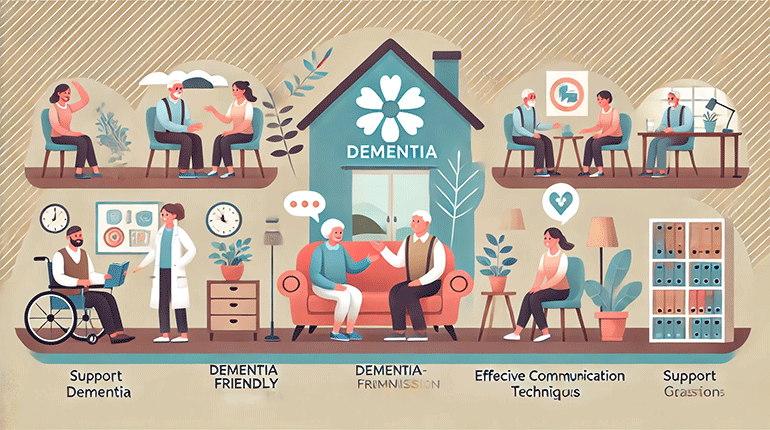Support and Care for People with Dementia
Dementia is a progressive condition that impacts not only individuals but also their families and caregivers. Providing effective support and care is crucial to enhancing the quality of life for those affected. This involves creating dementia-friendly environments, adopting effective communication strategies, and utilizing available services and resources for caregivers.
The Importance of Creating a Dementia-Friendly Environment
A dementia-friendly environment is one that is safe, supportive, and accommodating to the needs of individuals with dementia. Such environments help reduce confusion, anxiety, and frustration, promoting independence and well-being.
Key elements of a dementia-friendly environment include clear signage, good lighting, and clutter-free spaces. Labels and symbols on doors, cupboards, and other areas can guide individuals and reduce disorientation. Contrasting colors can highlight important objects, such as handrails or light switches, making them easier to identify.
Safety features are also essential. These include non-slip flooring, secure locks, and grab bars in bathrooms. Providing a predictable routine and familiar items, such as personal photos or cherished belongings, helps create a sense of comfort and security. Outdoor spaces should be enclosed and accessible, offering a safe area for walking and relaxation.
Community-level initiatives also contribute to dementia-friendly environments. Educating businesses, schools, and public institutions about dementia awareness ensures that people with dementia feel welcomed and supported in public settings.
Effective Communication Tips for Interacting with Individuals with Dementia
Communication challenges are common in dementia, as individuals may struggle with memory, understanding, and expressing themselves. Adopting effective communication techniques can improve interactions and reduce frustration for both parties.
Use Simple Language: Speak slowly and clearly, using short sentences and familiar words. Avoid complex instructions or abstract concepts.
Be Patient and Listen: Allow extra time for responses, and refrain from interrupting. Show genuine interest in what the person is trying to communicate.
Maintain Eye Contact: Face the person directly and maintain eye contact to convey attentiveness and respect.
Use Non-Verbal Cues: Gestures, facial expressions, and a calm tone of voice can provide additional context and reassurance.
Avoid Correcting or Arguing: Focus on the emotions behind the words rather than correcting inaccuracies. Validating their feelings fosters trust and reduces anxiety.
Encouraging activities that stimulate communication, such as listening to music, looking at photos, or engaging in light exercises, can further enhance connections and maintain cognitive function.
Services and Resources for Caregivers
Caregivers play an indispensable role in supporting individuals with dementia, but the demands of caregiving can be physically and emotionally taxing. Accessing services and resources is vital to ensure caregivers receive the help they need.
Respite Care: Respite care provides temporary relief for caregivers, enabling them to rest and recharge. Options include in-home respite services, adult day programs, and short-term stays in care facilities.
Support Groups: Joining caregiver support groups offers a platform to share experiences, seek advice, and build connections with others facing similar challenges. These groups provide emotional support and practical tips for managing caregiving responsibilities.
Educational Programs: Many organizations offer training and workshops on dementia care, equipping caregivers with skills to handle complex situations effectively. Topics include managing behavioral changes, ensuring safety, and fostering engagement.
Professional Services: Access to healthcare professionals, such as social workers, counsellors, and occupational therapists, can provide personalized guidance and assistance. They can help navigate legal, financial, and care planning issues.
Online resources, helplines, and community-based services also play a crucial role in supporting caregivers. Organizations like Alzheimer’s Society and Age UK offer comprehensive resources, including guides, webinars, and local service directories.

